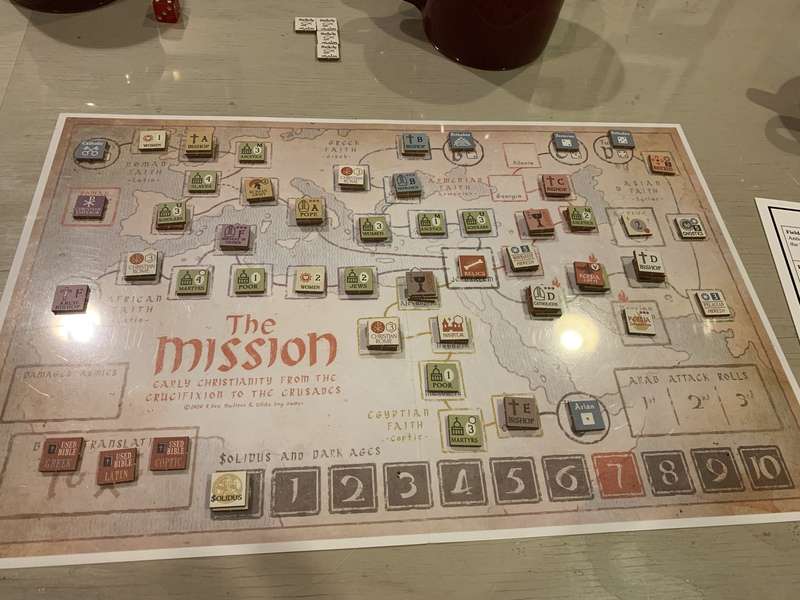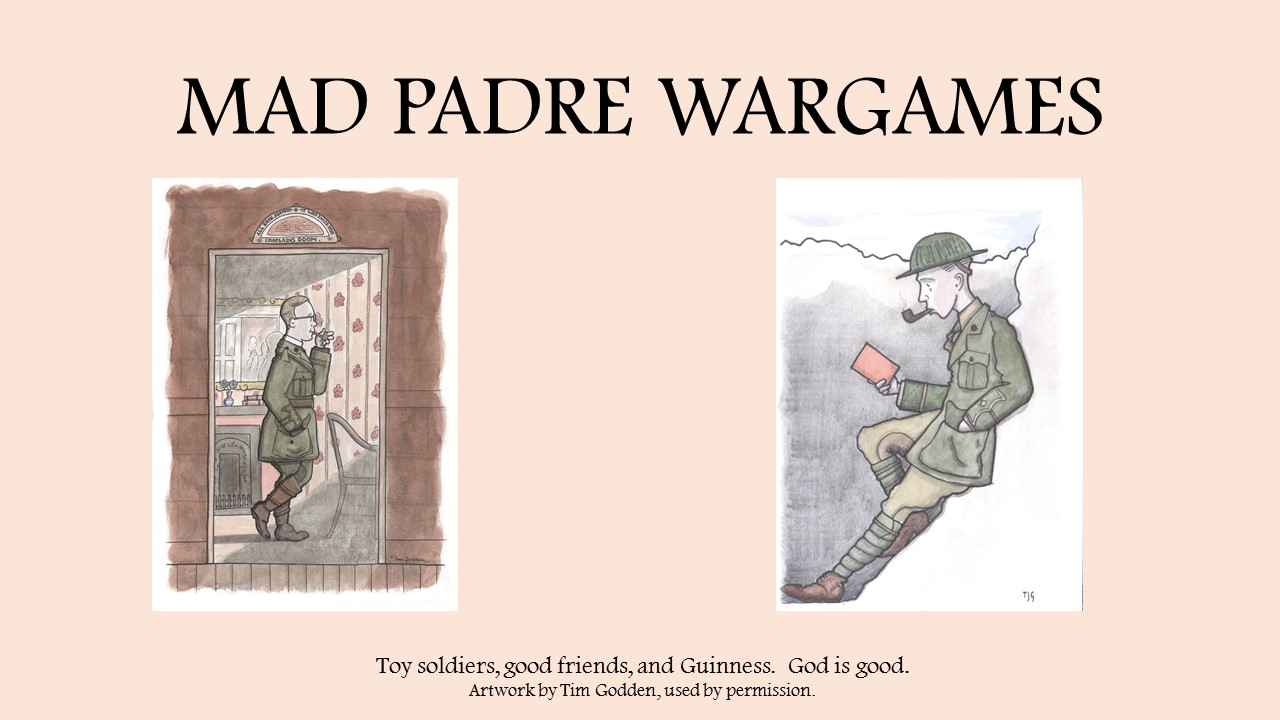The Mission by White Dog Games is one of those rare games where you genuinely feel like you are learning as you play. Designed by the highly prolific Ben Madison, The Mission is a solitaire game covering the whole of Christian history from the death of Jesus to the beginning of the First Crusades. During that time your job is to spread the Christian gospel throughout the known world, establish the church, and then defend it from enemies within and without. At games’ end, in the 12th century, your score will determine whether Christianity survives as a world religion or as a small cult practiced in some backwards region.
The Mission is a 4X game with emphasis on the first three Xs: Explore, Expand, Exploit. The fourth X, Exterminate, is something you try to avoid. At first things seem easy, as the original apostles move out from Jerusalem with the gospel of Jesus. Soon they will die and their bones will become relics, which may help you financially later in the game, but before they pass away they have, hopefully, won a foothold in each of the six geographic tracks of the game board.

In the first phase of the game, you move further out on each of these tracks, attempting to convert regions which in turn give you revenue to fund missionaries and bishops, build key infrastructure (hospitals, monasteries, and universities), and translate the bible into regional languages (Latin, Greek, Armenian, Coptic, and Syriac). Before Constantine, the Roman Empire can hinder or tolerate you, depending on the policies of various Caesars. After the Empire becomes Christian, you make hay while the sun shines, because it gets tougher later on when the Empire collapses.
In the Dark Ages stage of the game, you now try to defend the five tracks against various hordes of people pushing towards the centre over 28 turns, each covering a varying number of decades. After the fall of Rome, some of these encroaching peoples can be converted if you work at it (always convert the Saxons if you can), and others have to be resisted as best you can. Good luck with North Africa, you’ll need it. Later on, when you’ve hopefully got the hordes under control, the rise of Islam means that various jihads emanate from Jerusalem in the centre and try to conquer their way outwards. so you’re always fighting fires and trying to keep regions from being conquered and slipping into apostasy. Translating the bible helps, as do various great theologians, but at the same time you’ll face challenges from local despots, schisms where various regions choose their own popes and stop talking to you or sending you money, and that perpetual annoyance, heretics. As regions fall into heresy, you can either sweet talk them back into the orthodox faith or ruthlessly suppress them, though cruelty can work against you in the long run.
I’ve taught church history in my profession as a vicar so I thrive on this sort of thing, and don’t think there’s been a game on this subject so good since Jim Dunnigan’s venerable SPI title Empires of the Middle Ages, though the two games are only roughly comparable. If your worldview is secular but you’re interested in the ancient or medieval histories, this game does a good job of showing you the transition from the first to the second.
White Dog Games uses a print on demand business model. The components are attractively designed and presented, and the counters are on thick laser cut cardboard. You’ll need four mugs or containers to hold various sets of random chits, and the game board gets more crowded as the centuries proceed. My first game went fairly well. The rules and player aid charts are well laid out and the rules explain themselves as you go along.
I did reasonably well for Christianity in my first game, and look forward to trying it again. Highly recommended. The Mission gets the Mad Padre blessing.
MP+
At f

I new one to me. It does look interesting.
ReplyDeleteNot for everyone, but the mechanics are well thought out. Not many games give you such a broad sweep of history - its akin to Sid Meier's Civilization that way.
DeleteFascinating game, I had never heard of it. I looked at their website, it full of really interesting looking games.
ReplyDeleteIt's a little gem of a publishing company. I bought their game Jihad about the first crusade as well and look forward to playing it some time in the new year.
DeleteThanks Padre. I wouldn't have thought a game about hierophants and the Council of Nicea would work. It does sound interesting.
ReplyDeleteCheers. Actually a game just about one of the church councils, like Nicaea, would be be fascinating - something along the lines of GMT's COIN game on the Treaty of Versailles - https://www.gmtgames.com/p-711-versailles-1919.aspx
DeleteI am not a board gamer by any stretch of the imagination but this actually sounds like it would be quite interesting to play - should I deploy the Inquisition or not....yes, I know that comes later than 1200! I guess the game could have a sequel with rise of Luther and then Calvin in the 15/16 centuries...
ReplyDeleteNow you're making me want to play GMT's Here I Stand, the only game I know about the reformation, though whatever design Ben Madison came up with would be cracking, I'm sure.
DeleteHi Padre -
ReplyDeleteNot the usual sort of topic for a board game! As probably by far the most proselytising religion there has ever been, probably only Christianity could be the subject (and object!) of such a game. I'm just wondering how the internal schisms/ conflicts are handled, and the contentions between papal tiara and crown (e.g. Pope Gregory VII vs Emperor Henry IV) might have been handled. Interesting!
Cheers,
Ion
Hello Ion:
ReplyDeleteYes, an unusual subject to be sure. I suppose there could be an Islamic equivalent.
Schisms are modelled as the possible results of decisions by one branch or another to go a certain way theologically (eg, the Latin branch of the church opting for Arianism) which then triggers a "vote'" - depending on how outre the theolgy is, there is a good chance that branch will become schismatic, so no dosh for you the player and its very hard to influence results on that track of the board. The game isn't granular enough to model Pope vs King conflicts, though some regions may fall out of your control as local rulers pop up after the fall of Rome.
Really enjoyed this review — it perfectly captures what makes The Mission such a unique and thoughtful game. I love how you highlighted that sense of learning through play, which is rare in historical or religious-themed games. Ben Madison’s design sounds both ambitious and immersive, especially with its focus on faith, politics, and survival across centuries.
ReplyDeleteYour background as a vicar adds a fascinating perspective — it’s great to see how the gameplay aligns with real historical and theological dynamics. The comparison to Empires of the Middle Ages is spot-on too. Definitely sounds like a must-try for anyone who loves deep, historically rich solitaire games!